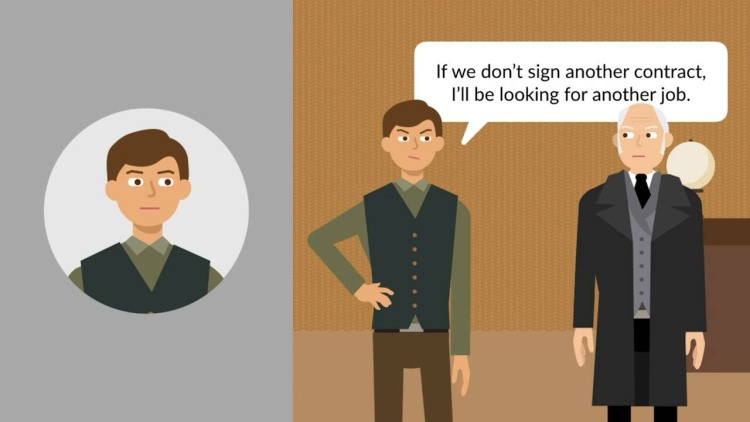Embry v. Hargadine, McKittrick Dry Goods Co.
Missouri Court of Appeals
105 S.W. 777, 127 Mo.App. 383 (1907)
- Written by Megan Petersen, JD
Facts
Embry (plaintiff) was employed by Hargadine, McKittrick Dry Goods Co. (McKittrick) (defendant). Embry was first hired under a written contract, which provided that he would be employed for one year at a salary of $2,000 per year. Embry stated that near the termination of the written contract, he attempted on several occasions to convince the company’s president, Thos. H. McKittrick, to employ him for an additional year under the same terms. Although both parties agreed that conversations between Embry and McKittrick took place, they disagreed as to the substance and result of those conversations. Embry stated that he informed McKittrick that if his contract was not renewed, he would leave his position. Embry stated that in response to his statement, McKittrick assured him to go about his business without worry. Embry indicated he relied on this statement as a manifestation of intent by McKittrick to reemploy him for an additional year. McKittrick agreed that Embry gave him an ultimatum, but he denied Embry's recounting of their conversation. Rather, McKittrick said he told Embry that Embry should go and get his men on the road, but McKittrick would have to take up the contract matter with Embry at a later time, because McKittrick was preparing for a stockholder meeting. Approximately two months after this conversation occurred, Embry’s employment with McKittrick was terminated. Embry brought suit on the ground that his termination violated his employment contract. During the trial, the court instructed the jury that the conversation as remembered by Embry would make a contract if the jury found that by that conversation, both parties intended to, and did, contract for Embry's continued employment. After a trial, the jury found in McKittrick's favor. Embry appealed. On appeal, Embry asserted that the trial court’s jury instruction was inappropriate because it required the jury to find not only that the conversation happened as Embry remembered, but also that the parties intended by the conversation to enter into a contract with each other for Embry’s continued employment.
Rule of Law
Issue
Holding and Reasoning (Goode, J.)
What to do next…
Here's why 904,000 law students have relied on our case briefs:
- Written by law professors and practitioners, not other law students. 47,100 briefs, keyed to 995 casebooks. Top-notch customer support.
- The right amount of information, includes the facts, issues, rule of law, holding and reasoning, and any concurrences and dissents.
- Access in your classes, works on your mobile and tablet. Massive library of related video lessons and high quality multiple-choice questions.
- Easy to use, uniform format for every case brief. Written in plain English, not in legalese. Our briefs summarize and simplify; they don’t just repeat the court’s language.





